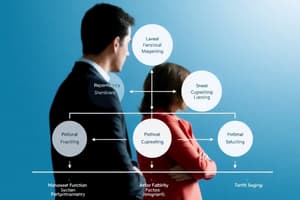Podcast
Questions and Answers
What is the primary focus of efficiency in management?
What is the primary focus of efficiency in management?
- Doing the right things to achieve goals
- Ensuring that organizational goals are met at all times
- Getting the most output from the least amount of input (correct)
- Minimizing costs while maximizing employee satisfaction
Which level of management is responsible for overseeing non-managerial employees?
Which level of management is responsible for overseeing non-managerial employees?
- Top Managers
- Middle Managers
- First-Line Managers (correct)
- Executive Managers
Which managerial function involves arranging and structuring work to accomplish organizational goals?
Which managerial function involves arranging and structuring work to accomplish organizational goals?
- Organizing (correct)
- Leading
- Controlling
- Planning
What are the three grouped roles identified by Mintzberg for managers?
What are the three grouped roles identified by Mintzberg for managers?
Which type of managerial skill involves the ability to work well with others?
Which type of managerial skill involves the ability to work well with others?
What is the main purpose of planning in management?
What is the main purpose of planning in management?
Which of the following is NOT a characteristic of an organization?
Which of the following is NOT a characteristic of an organization?
What does controlling in management primarily involve?
What does controlling in management primarily involve?
What is a critical challenge that managers face in the modern business environment?
What is a critical challenge that managers face in the modern business environment?
Which of the following best describes disruptive innovation?
Which of the following best describes disruptive innovation?
How does social media impact business communication?
How does social media impact business communication?
Why is building trust important for organizational survival?
Why is building trust important for organizational survival?
What recent political trend has been observed in major democratic nations?
What recent political trend has been observed in major democratic nations?
Which factor is crucial for delivering consistent, high-quality customer service?
Which factor is crucial for delivering consistent, high-quality customer service?
What role do managers play in an organization?
What role do managers play in an organization?
Which of the following is NOT a characteristic of effective management?
Which of the following is NOT a characteristic of effective management?
What distinguishes effectiveness from efficiency in management?
What distinguishes effectiveness from efficiency in management?
In a traditionally structured organization, which level of management is primarily responsible for integrating and coordinating activities?
In a traditionally structured organization, which level of management is primarily responsible for integrating and coordinating activities?
Which category includes the roles that involve managing relationships and information transfer in management according to Mintzberg?
Which category includes the roles that involve managing relationships and information transfer in management according to Mintzberg?
Which managerial function is primarily concerned with ensuring that organizational activities are on track?
Which managerial function is primarily concerned with ensuring that organizational activities are on track?
What type of skills is characterized by the ability to conceptualize complex and abstract organizational scenarios?
What type of skills is characterized by the ability to conceptualize complex and abstract organizational scenarios?
Which of the following describes the major responsibility of top managers in an organization?
Which of the following describes the major responsibility of top managers in an organization?
Among Mintzberg's identified roles, which role is focused on negotiating and allocating resources within an organization?
Among Mintzberg's identified roles, which role is focused on negotiating and allocating resources within an organization?
Which characteristic is NOT typically associated with organizations as defined in management concepts?
Which characteristic is NOT typically associated with organizations as defined in management concepts?
What is a primary responsibility of managers concerning social media in the workplace?
What is a primary responsibility of managers concerning social media in the workplace?
How has disruptive innovation historically impacted industries?
How has disruptive innovation historically impacted industries?
Which factor is essential for managers when aiming to enhance customer relationships?
Which factor is essential for managers when aiming to enhance customer relationships?
Why is it crucial for managers to build trust with stakeholders?
Why is it crucial for managers to build trust with stakeholders?
What characterizes the recent shift in political stability in democratic nations?
What characterizes the recent shift in political stability in democratic nations?
What is one responsibility of managers regarding workplace creativity?
What is one responsibility of managers regarding workplace creativity?
Which of the following best describes the significance of managers in modern organizations?
Which of the following best describes the significance of managers in modern organizations?
What is a common unethical practice often reported in business industries?
What is a common unethical practice often reported in business industries?
What is the primary responsibility of top managers within an organization?
What is the primary responsibility of top managers within an organization?
Which term best describes the ability to achieve organizational goals effectively?
Which term best describes the ability to achieve organizational goals effectively?
In which managerial function would a manager most likely define goals and establish strategies?
In which managerial function would a manager most likely define goals and establish strategies?
Which of the following best represents the interpersonal roles defined by Mintzberg?
Which of the following best represents the interpersonal roles defined by Mintzberg?
What type of skills is essential for understanding abstract and complex organizational situations?
What type of skills is essential for understanding abstract and complex organizational situations?
Which managerial role would a manager be performing when negotiating resource allocation?
Which managerial role would a manager be performing when negotiating resource allocation?
What is a defining characteristic of an organization?
What is a defining characteristic of an organization?
Which of the following actions would fall under the controlling function of management?
Which of the following actions would fall under the controlling function of management?
What is a key aspect of managing disruptive innovation?
What is a key aspect of managing disruptive innovation?
How should managers approach the challenges posed by social media?
How should managers approach the challenges posed by social media?
What is an example of recent political uncertainty faced by democratic nations?
What is an example of recent political uncertainty faced by democratic nations?
What role does trust play in organizational survival?
What role does trust play in organizational survival?
Why is it critical for managers to focus on the customer?
Why is it critical for managers to focus on the customer?
What should managers prioritize to foster a productive work environment?
What should managers prioritize to foster a productive work environment?
What is a common unethical practice reported in industries today?
What is a common unethical practice reported in industries today?
What must managers do to effectively incorporate new technology in the workplace?
What must managers do to effectively incorporate new technology in the workplace?
Study Notes
Managerial Roles and Functions
- Managers coordinate and oversee work to achieve organizational goals.
- Management includes four core functions: planning, organizing, leading, and controlling.
- Efficiency: Achieving maximum output with minimal input.
- Effectiveness: Attaining organizational goals through proper actions.
Levels of Management
- First-Line Managers: Supervise non-managerial employees, focusing on day-to-day operations.
- Middle Managers: Oversee first-line managers and act as a bridge between top management and lower levels.
- Top Managers: Responsible for organization-wide decisions and long-term strategies.
Characteristics of Organizations
- Organizations are deliberately structured to achieve specific purposes.
- Common characteristics: distinct purpose, deliberate structure, and people working collaboratively.
Managerial Skills
- Technical Skills: Knowledge and proficiency in specific tasks or areas.
- Human Skills: Ability to collaborate effectively with others.
- Conceptual Skills: Capacity to understand complex situations and abstract concepts.
Managerial Roles According to Mintzberg
- Interpersonal Roles: Figurehead, leader, liaison.
- Informational Roles: Monitor, disseminator, spokesperson.
- Decisional Roles: Entrepreneur, disturbance handler, resource allocator, negotiator.
Current Challenges in Management
- Increasing focus on technology, including the impact of disruptive innovations.
- Managers must navigate challenges posed by social media and ensure healthy communication.
- Unethical practices, such as drastic price increases, highlight the need for ethical management.
- Building trust among stakeholders is crucial for organizational survival.
Political and Customer Dynamics
- Recent political uncertainty in major nations (e.g., Brexit, USMCA) impacts organizational strategies.
- Effective customer relationship management is essential; it involves all employees at various levels.
- High-quality customer service should be a consistent goal across organizations.
Importance of Management
- Management is universally required across all types and sizes of organizations.
- Managers create environments where employees can thrive, promoting creativity and job satisfaction.
- Recognition and appropriate compensation are key motivators for managers and employees alike.
Managerial Roles and Functions
- Managers coordinate and oversee work to achieve organizational goals.
- Management includes four core functions: planning, organizing, leading, and controlling.
- Efficiency: Achieving maximum output with minimal input.
- Effectiveness: Attaining organizational goals through proper actions.
Levels of Management
- First-Line Managers: Supervise non-managerial employees, focusing on day-to-day operations.
- Middle Managers: Oversee first-line managers and act as a bridge between top management and lower levels.
- Top Managers: Responsible for organization-wide decisions and long-term strategies.
Characteristics of Organizations
- Organizations are deliberately structured to achieve specific purposes.
- Common characteristics: distinct purpose, deliberate structure, and people working collaboratively.
Managerial Skills
- Technical Skills: Knowledge and proficiency in specific tasks or areas.
- Human Skills: Ability to collaborate effectively with others.
- Conceptual Skills: Capacity to understand complex situations and abstract concepts.
Managerial Roles According to Mintzberg
- Interpersonal Roles: Figurehead, leader, liaison.
- Informational Roles: Monitor, disseminator, spokesperson.
- Decisional Roles: Entrepreneur, disturbance handler, resource allocator, negotiator.
Current Challenges in Management
- Increasing focus on technology, including the impact of disruptive innovations.
- Managers must navigate challenges posed by social media and ensure healthy communication.
- Unethical practices, such as drastic price increases, highlight the need for ethical management.
- Building trust among stakeholders is crucial for organizational survival.
Political and Customer Dynamics
- Recent political uncertainty in major nations (e.g., Brexit, USMCA) impacts organizational strategies.
- Effective customer relationship management is essential; it involves all employees at various levels.
- High-quality customer service should be a consistent goal across organizations.
Importance of Management
- Management is universally required across all types and sizes of organizations.
- Managers create environments where employees can thrive, promoting creativity and job satisfaction.
- Recognition and appropriate compensation are key motivators for managers and employees alike.
Managerial Roles and Functions
- Managers coordinate and oversee work to achieve organizational goals.
- Management includes four core functions: planning, organizing, leading, and controlling.
- Efficiency: Achieving maximum output with minimal input.
- Effectiveness: Attaining organizational goals through proper actions.
Levels of Management
- First-Line Managers: Supervise non-managerial employees, focusing on day-to-day operations.
- Middle Managers: Oversee first-line managers and act as a bridge between top management and lower levels.
- Top Managers: Responsible for organization-wide decisions and long-term strategies.
Characteristics of Organizations
- Organizations are deliberately structured to achieve specific purposes.
- Common characteristics: distinct purpose, deliberate structure, and people working collaboratively.
Managerial Skills
- Technical Skills: Knowledge and proficiency in specific tasks or areas.
- Human Skills: Ability to collaborate effectively with others.
- Conceptual Skills: Capacity to understand complex situations and abstract concepts.
Managerial Roles According to Mintzberg
- Interpersonal Roles: Figurehead, leader, liaison.
- Informational Roles: Monitor, disseminator, spokesperson.
- Decisional Roles: Entrepreneur, disturbance handler, resource allocator, negotiator.
Current Challenges in Management
- Increasing focus on technology, including the impact of disruptive innovations.
- Managers must navigate challenges posed by social media and ensure healthy communication.
- Unethical practices, such as drastic price increases, highlight the need for ethical management.
- Building trust among stakeholders is crucial for organizational survival.
Political and Customer Dynamics
- Recent political uncertainty in major nations (e.g., Brexit, USMCA) impacts organizational strategies.
- Effective customer relationship management is essential; it involves all employees at various levels.
- High-quality customer service should be a consistent goal across organizations.
Importance of Management
- Management is universally required across all types and sizes of organizations.
- Managers create environments where employees can thrive, promoting creativity and job satisfaction.
- Recognition and appropriate compensation are key motivators for managers and employees alike.
Studying That Suits You
Use AI to generate personalized quizzes and flashcards to suit your learning preferences.
Description
Test your knowledge on key management concepts, including efficiency, effectiveness, and the roles of first-line and middle managers. This quiz covers the foundational principles of management and the coordination needed in organizational settings. Ideal for students and professionals looking to enhance their understanding of management.




